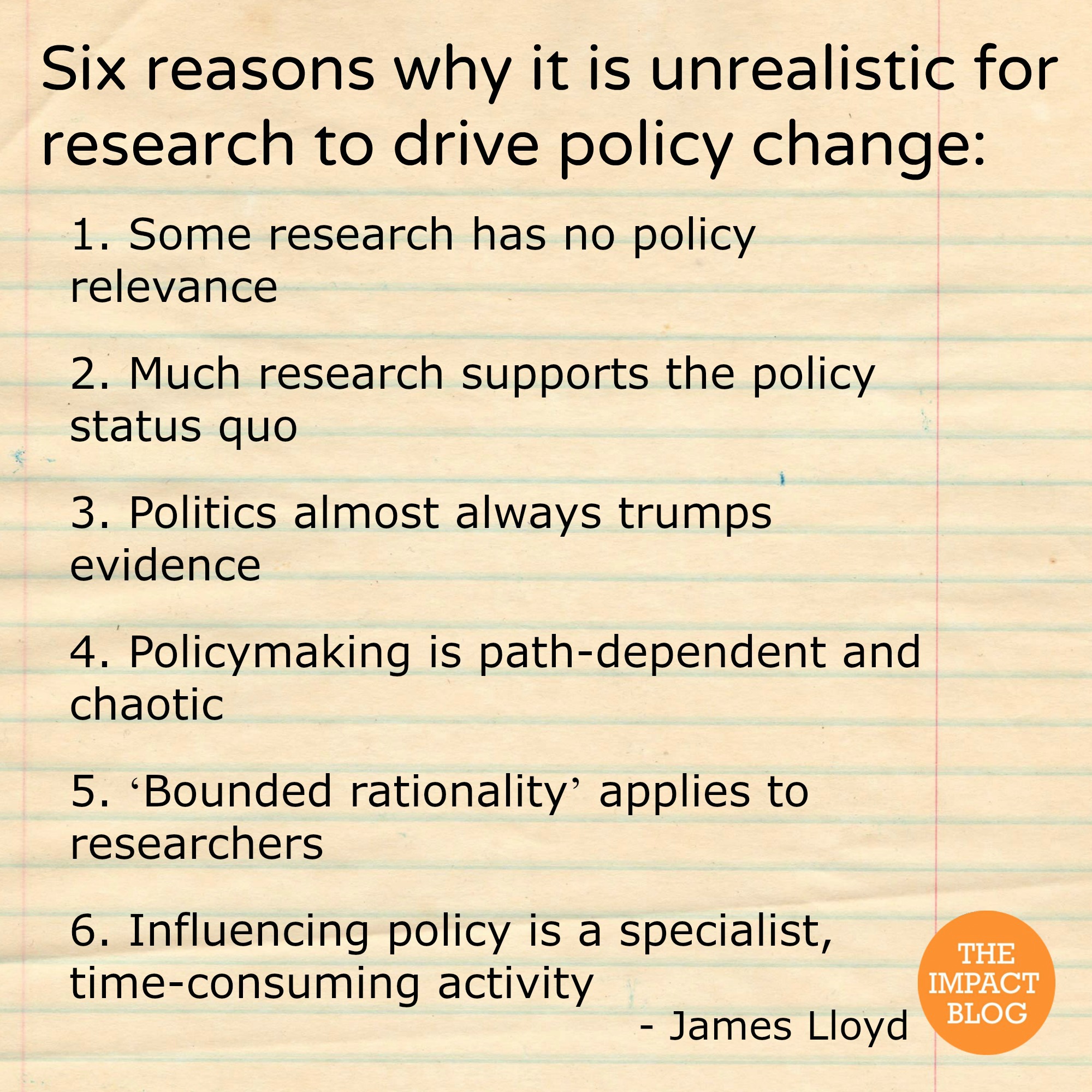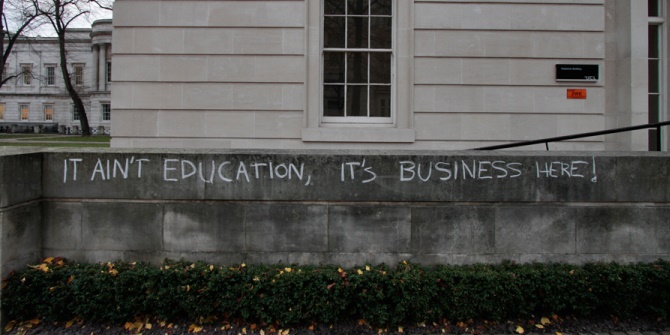 UK social scientists feel a growing pressure to achieve policy change. In reality, this process is more complex than it sounds. James Lloyd looks at six reasons that limit the impact research can have on policy change. None of this should suggest that academic researchers shouldn’t seek to influence policymaking. But more consideration is needed on how best academic evidence can leverage the real-world nature of policymaking.
UK social scientists feel a growing pressure to achieve policy change. In reality, this process is more complex than it sounds. James Lloyd looks at six reasons that limit the impact research can have on policy change. None of this should suggest that academic researchers shouldn’t seek to influence policymaking. But more consideration is needed on how best academic evidence can leverage the real-world nature of policymaking.
There has been understandable relief at indications from the government that academic researchers will be exempt from anti-advocacy clauses in research grant contracts. The possibility that academics with publicly funded research grants would not be able to press the government for policy change was clearly unacceptable and anti-democratic.
However, the announcement comes at a time of intense debate about the importance of academics being seen to achieve public policy change using their research. Everyone agrees the best available evidence should inform policy decision-making. And most can point to policy decisions that fall short of the paradigm of ‘evidence-based policy-making’. Yet out of such consensus, UK social scientists seemingly feel under growing pressure to achieve policy change: to show not just engagement or use of their research – both challenging in themselves – but discernible changes in policy and practice.
The notion of academic experts as objective, benign guardians of knowledge who can glide into the policy process and effect change through revealing the insights from their work is an attractive one. But is it realistic or even desirable to expect academics to achieve policy change? Here are some reasons to think not:
1. Some research has no policy relevance
This should be obvious, but it is worth highlighting that much excellent social science research has limited relevance to public policy or contemporary policy debates and agendas.
2. Much research supports the policy status quo
Another truth that is more obvious to those working in policy analysis: much social science research supports the status quo in public policy. However, such research is no less useful or important to policymakers, and it is wrong to think that research has only achieved policy impact if there is an identifiable change in policy design.
3. Politics almost always trumps evidence
Evidence-based policymaking is an attractive paradigm, but in a parliamentary democracy, political considerations will almost always take precedence. Policy decision-making is bound by what is politically feasible. If a researcher’s work points to policy choices beyond these boundaries, it is usually unrealistic to expect policy change, however compelling the research findings. And if bits of an academic’s research help to justify a politician’s ideology or perspective, it is usually the findings that will be most likely to result in policy change.
4. Policymaking is path-dependent and chaotic
Expecting anyone from any field to routinely influence or change policy is unrealistic. Personalities, relationships and politics all determine policy decisions, more than we might want to believe. Even formal government ‘consultations’ are subject to drivers and motivations not apparent to anyone outside the sponsoring department.
5. ‘Bounded rationality’ applies to researchers
Just as policymakers are limited in their analytical and knowledge capacity, so are academic researchers. Academics may think they know how a particular public policy should be designed, but there are inevitably factors beyond their knowledge or understanding, and they are not necessarily well placed to make policy recommendations. In fact, the role of ‘policy analyst’ is increasingly being promoted as a standalone profession by the civil service, involving distinct knowledge and skills that academics are simply not trained or practised in.
6. Influencing policy is a specialist, time-consuming activity
Indeed, a huge lobbying industry comprised of skilled, experienced public affairs professionals exists to influence policy decisions for their clients or employers – often with negligible success. It is not realistic to expect specialist academic researchers to possess a skill-set from a completely different sector, nor compete effectively with it when academics promote policy recommendations that conflict with other interest groups.
 Of course, none of this should suggest that academic researchers shouldn’t seek to influence policymaking if they want to. A select few are stunningly successful at it. And of course, academics have a social responsibility to ensure their work is accessible and available for use in policy design and decision-making. The impact agenda has been highly effective in changing academic culture, and increasing openness and engagement. Few would now dispute that researchers have a responsibility to ensure non-technical summaries of their research are available, their publications are properly logged in searchable depositories, and to engage with relevant opportunities, such as calls for evidence from Parliamentary Select Committees.
Of course, none of this should suggest that academic researchers shouldn’t seek to influence policymaking if they want to. A select few are stunningly successful at it. And of course, academics have a social responsibility to ensure their work is accessible and available for use in policy design and decision-making. The impact agenda has been highly effective in changing academic culture, and increasing openness and engagement. Few would now dispute that researchers have a responsibility to ensure non-technical summaries of their research are available, their publications are properly logged in searchable depositories, and to engage with relevant opportunities, such as calls for evidence from Parliamentary Select Committees.
However, expecting academic researchers to achieve policy change is incoherent with the real-world nature of policymaking. It reflects an incomplete understanding of how policymaking occurs. If we do want to see more UK social science achieve policy change, then what is required? Whole books could be written on this topic. But here are some pointers.
First, more emphasis, investment and time needs to be spent on selection of research that has the potential to change policy. This suggests the need for more capacity built into impact processes that uses experienced policy professionals with broad policy knowledge.
Second, central to policymaking and related debates are policy narratives: the ‘stories’ that resonate with decision makers about the choices before them. Research findings are not policy narratives, and helping more research achieve policy change will require more focus on how research findings are presented as policy narratives.
Finally, more thought is required about the role of academic researchers as policy actors, or ‘policy entrepreneurs’. For a range of reasons, it is far from clear that academic researchers are well placed to be the policy entrepreneur that uses their research to drive policy change. This means more attention needs to be given to the other policy actors available, who participate in and drive policy debates.
___
Note: This article was originally published on the LSE Impact blog.
 James Lloyd is Director of the Strategic Society Centre. He read Philosophy at University College London, and has Masters degrees in Comparative Politics and in Public Policy. James has worked at a number of Westminster think-tanks, and at the Prime Minister’s Strategy Unit. James has taken part in various expert working groups and committees for the Department of Health and HM Treasury, and is currently an Advisor to the ESRC Research Centre on Micro-Social Change at the University of Essex. He has been called as an expert witness to provide oral evidence to the Health Select Committee, the Pension Schemes Bill Committee and the Public Administration Select Committee.
James Lloyd is Director of the Strategic Society Centre. He read Philosophy at University College London, and has Masters degrees in Comparative Politics and in Public Policy. James has worked at a number of Westminster think-tanks, and at the Prime Minister’s Strategy Unit. James has taken part in various expert working groups and committees for the Department of Health and HM Treasury, and is currently an Advisor to the ESRC Research Centre on Micro-Social Change at the University of Essex. He has been called as an expert witness to provide oral evidence to the Health Select Committee, the Pension Schemes Bill Committee and the Public Administration Select Committee.









Of course there are limits of research in policy-making and many researches are not worth of policy-making. However, it doesn’t mean that research has to do nothing in policy reforms. There are varieties of research in terms of typology and quality. Researchers are also not uniform value-free entity; they have different traits and qualities. Similarly, they may have varied interest, motives and incentives. For this reason, generalization and sweeping points/statements often fail to reflect the ground reality.
I am a practioner and I value research. For me a good policy requires both: research-based knowledge and practical insights. Putting research into the litmus of real-world practice helps policy reforms. For this we got to have a strong interface between the policy practioners and researchers/academia.
A thought provoking read, thank you. Research will struggle to keep pace with the unfolding of events in real-time, thus rendering time pressured policy judgments more akin to informed-intuition based artistic acts than methodically reasoned, long dwelt upon scientific conclusions. And naturally, politicians enjoy access to myriad flows of sensitive data that most of us would have to wait decades to obtain (if ever). Not to say academia shouldn’t help feed ideas and information into this stream as and when may be helpful to do so, it should perhaps see its self as a supporting element rather than definitive account on real-time issues. Long term trends/slow moving policy may prove slightly different as a 3 year PhD may be well what a specific policy needs to help it mature.
I found this article a bit depressing and a bit old fashioned. As someone who’s been on both sides of this it reads very much like stick to your area.
We’re very slowly starting to move towards experimental policy using proper rigorous methodologies which should be ideal for both academics and policymakers.
Unfortunately political expediency wins every time in policymaking and there aren’t enough scientists driving policy at the top, so there is a big deficit in expertise at the centre of the policy base. Other countries do this better.
It’s interesting, and symptomatic of the wider problem, that you treat the words “researcher” and “academic” as synonyms. Vast amounts of social research is done in the private sector, most obviously market research; in government run industries like healthcare, and by civil servants. It does not go through academic processes because so-called peer review is not the right kind of review for understanding research that is good because it is practically relevant. There is no question this wider research is of mixed quality and there is little proper QA, but we need to move away from thinking academia is the only form of expert research to improve the quality of this wider research
Thanks for the wonderful information, indeed it me while working on some difficult topics.
Whilst some academics utilise inappropriate methodologies and study scenarios at arm’s length, it is perhaps too much of a sweeping generalisation to state the majority have failed to grasp the polticised drivers of policy selection and implementation. The underpinning of the motivations varies, of course,but social scientists are now moving beyond the recognition of the ‘messiness’ of policy framing and taking account of this complexity in analysing real world policy making.That’s not to say academics have the only or best perspective on forward, game-changing policies but there is probably as much contradiction of the status quo as there is support.
The academic perspective should stretch policy makers away from their safety zones, if appropriate of course or validate the relevance of a policy with perhaps local adaptation in other circumstances. Frequently, policy makers and advisors rely on ‘more of the same’ or ‘me too’ strategies which., as we’ve seen in many countries is spectacularly unsuccessful and has inter-generational consequences
There’s room at the big policy table for many players, including the stakeholders most affected. I’d agree that caution needs to be applied if narrowly defined and/or conceptually innovative ideas as tabled as ‘the solution’. Multi-stakeholder discussion at the early stage of policy development can bench-test these ideas and compare potential outcomes to more traditional policies (which, as we’ve seen many times also fail spectacularly). Therefore, rather than excluding, I’d say embrace academics and their ideas but look for the most appropriate and sustainable solution in the environ it is being designed for.
Dr E Alibayor’s comment provides the ultimate summation of the argument against academic leadership of policy formation processes. First they lack practical experience in the field and second, the use of less than scientific end evidence-based research methodologies. It is doubtful however whether researchers consciously and deliberately hold themselves out as providers of policy positions except as persons with considerable high degree of knowledge in their fields who can assist in identifying factors which policy makers should take into account in their decision making processes. Policy makers who uncritically rely on research outcomes lock stock and barrel as if they constitute imperial evidence of policy positions do so at the risk of their reputation as competent administrators.
Thank you for this concise but informative account of why academic research CANNOT drive the policy-making. I would add two features under one additional point why academics SHALL NOT drive the policy-making. First is that most of analysis in social sciences today is based on sophisticated computations using ‘rational agent’ models (or the like) which don’t represent the real life–how choices/decisions are made (by suppliers, intermediaries, and consumers), and as a result can be misleading in their forecasts. Second is that almost all academics lack practical experience (i.e. they haven’t worked ‘in the field’) and therefore don’t know the realities on the ground. Using statistics and publicised facts, or classroom experiments and various quantitative data collected with limited number of participants alone–is not enough to arrive at practical solution and recommendations for real life situations. As international development practitioner, I have read many papers written by academic researchers with recommendations for places where I was directly engaged with local contexts that were absolutely irrelevant. That said, science IS an important, indispensable part of the policy-making process, but only in the role of supplying impartial, evidence-informed advice. The rest is with practitioners–decision-makers and those who do and know things first-hand.